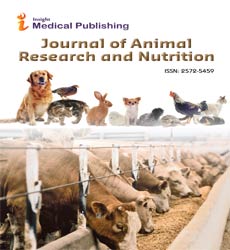The Ethical Conundrum of Animal Research: How to Balance Science and Compassion
Dylan Sanchez*
Department of Animal Research, University of Chile, Santiago, Chile
Published Date: 2023-08-07Dylan Sanchez*
Department of Animal Research, University of Chile, Santiago, Chile
- *Corresponding Author:
- Dylan Sanchez
Department of Animal Research,
University of Chile, Santiago,
Chile,
E-mail: sanchez_d@gmail.com
Received date: July 07, 2023, Manuscript No. IPJARN-23-17839; Editor assigned date: July 10, 2023, PreQC No. IPJARN-23-17839 (PQ); Reviewed date: July 24, 2023, QC No. IPJARN-23-17839; Revised date: July 31, 2023, Manuscript No. IPJARN-23-17839 (R); Published date: August 07, 2023, DOI: 10.36648/2572-5459.8.4.091
Citation: Sanchez D (2023) The Ethical Conundrum of Animal Research: How to Balance Science and Compassion. J Anim Res Nutr Vol.8 No.4: 091
Description
For ages, animal study has been a cornerstone of scientific discovery and medical improvement. It has been critical in studying diseases, testing new medications and treatments and deciphering biological intricacies. Animals have been crucial in pushing the boundaries of human knowledge, from vaccine development to genetics research. However, the use of animals in research has long been fraught with ethical considerations and disputes. This essay looks into the complex world of animal research, investigating its historical backdrop, scientific accomplishments, ethical quandaries and continuous efforts to strike a balance between scientific progress and animal care.
Animal research has its origins in ancient civilizations, when early scientists and philosophers began to dissect and study animals in their quest for knowledge. Aristotle, for example, performed thorough dissections on many animals to learn about their anatomy and physiology. However, it wasn't until the renaissance that animal studies really took off.
The invention of the microscope and other scientific devices during the renaissance period enabled researchers to investigate the complicated world of cells and bacteria. Pioneers such as Robert Hooke and Anton van Leeuwenhoek made enormous discoveries by researching cells and bacteria in animals, providing invaluable insights into how living organisms function. This era provided the groundwork for contemporary biology and medicine and animal experimentation was critical.
Animal research has been instrumental in numerous scientific breakthroughs and medical advancements. Some of the key areas in which animal research has made significant contributions include: The discovery of vaccines, one of the most significant achievements in medical history, relied heavily on animal research. Edward Jenner's experiments with cowpox and smallpox in the late 18th century laid the groundwork for vaccination, ultimately saving millions of lives worldwide. Animal models have been crucial in testing the safety and efficacy of pharmaceuticals before they are administered to humans. Drugs for various diseases, including cancer, cardiovascular diseases and infectious diseases, have undergone rigorous testing in animals before clinical trials. Studies on animals, such as Gregor Mendel's work with pea plants and later research on fruit flies and mice, have been fundamental in unraveling the principles of inheritance and genetics.
Animal models, particularly rodents, have played a crucial role in studying the brain and nervous system. Research on animals has led to advancements in our understanding of neurodegenerative diseases, mental illnesses and brain development. Transplantation research, including experiments with animals, has paved the way for organ transplantation in humans. Animal studies were essential in developing techniques to prevent transplant rejection and ensure the success of these life-saving procedures. Animals have been used to study diseases ranging from cancer to HIV/AIDS, providing insights into disease mechanisms, potential treatments and the development of vaccines. While these examples highlight the undeniable contributions of animal research to scientific progress and medical breakthroughs, they also raise ethical questions about the treatment of animals in research settings.
The Ethical Dilemma of Animal Research
The ethical dilemma surrounding animal research centers on the tension between scientific advancement and animal welfare. Several key ethical concerns are commonly raised: The use of animals in research often involves procedures that may cause pain, suffering, and distress. Critics argue that such suffering is unethical and questions whether it is justified by the potential benefits to humans. Critics argue that favoring humans over animals based solely on species membership is a form of discrimination known as speciesism. This ethical concern questions whether it is morally justifiable to subject animals to harm for the benefit of humans. Advances in technology and scientific methods have led to the development of alternative methods that can replace or reduce the use of animals in research. These alternatives, such as in vitro testing and computer modeling, raise the question of whether animals should continue to be used in research when alternative approaches are available.
Animals cannot provide informed consent to participate in research, unlike human subjects who can understand the risks and benefits and provide consent voluntarily. This ethical concern highlights the power imbalance between humans and animals in research settings. Some critics argue that findings from animal studies may not always translate accurately to humans, questioning the scientific validity of certain animal research.
Efforts to Address Ethical Concerns
Recognizing these ethical concerns, scientists, institutions and regulatory bodies have made significant efforts to minimize harm to animals and improve ethical standards in animal research. Some of these efforts include: Ethical guidelines and regulations, such as the Animal Welfare Act in the United States and the European Union Directive on the protection of animals used for scientific purposes, establish standards for the treatment and care of animals in research settings. The principle provides a framework for reducing the use of animals in research. Researchers are encouraged to seek alternatives to animal testing, minimize the number of animals used and refine procedures to reduce suffering. Research institutions often have animal care and use committees that oversee the ethical treatment of animals in research. These committees review research protocols to ensure compliance with ethical guidelines. Transparency in reporting animal research methods and results is essential for ethical scrutiny and public accountability. Journals and funding agencies may require researchers to provide detailed information about their animal experiments.
Advances in alternative methods, such as tissue culture, organ on a chip technology and computer modeling, offer potential alternatives to animal research. Engaging the public in discussions about the ethical aspects of animal research is critical. It allows for a broader understanding of the issues and helps shape policies and practices.
The ethical dilemmas surrounding animal research persist, but ongoing efforts seek to find a balance between scientific progress and animal welfare. Striking this balance requires a nuanced approach that considers both the benefits and ethical concerns associated with animal research. Continual improvement of ethical oversight mechanisms, including animal care and use committees, is essential to ensure that research involving animals adheres to the highest ethical standards.
Encouraging the development and adoption of alternative methods that reduce or replace the use of animals in research is a vital step toward minimizing harm. Providing researchers with education and training on ethical principles and the responsible use of animals in research can help ensure that animals are treated with care and respect.
Engaging the public in discussions about animal research, its ethical implications, and the benefits it brings to society can help foster a greater understanding of the issue. Advances in technology, such as improved imaging techniques and noninvasive monitoring, can reduce the need for invasive procedures in animal research. Researchers should continue to explore the scientific validity of animal models and seek ways to improve their predictive value for human outcomes.
Animal research has been a driving force behind many scientific discoveries and medical breakthroughs, but it has also raised complex ethical questions about the treatment of animals in research settings. The ethical dilemma surrounding animal research requires ongoing scrutiny, discussion and efforts to find a balance between scientific progress and animal welfare.
While ethical concerns persist, it is essential to acknowledge that animal research has contributed significantly to our understanding of biology, disease and medicine. Researchers, institutions and regulatory bodies must continue to work together to ensure that the ethical treatment of animals remains a top priority in the pursuit of scientific knowledge and medical advancements. Ultimately, the future of animal research depends on our ability to navigate this delicate balance with empathy, responsibility and a commitment to ethical principles.

Open Access Journals
- Aquaculture & Veterinary Science
- Chemistry & Chemical Sciences
- Clinical Sciences
- Engineering
- General Science
- Genetics & Molecular Biology
- Health Care & Nursing
- Immunology & Microbiology
- Materials Science
- Mathematics & Physics
- Medical Sciences
- Neurology & Psychiatry
- Oncology & Cancer Science
- Pharmaceutical Sciences
